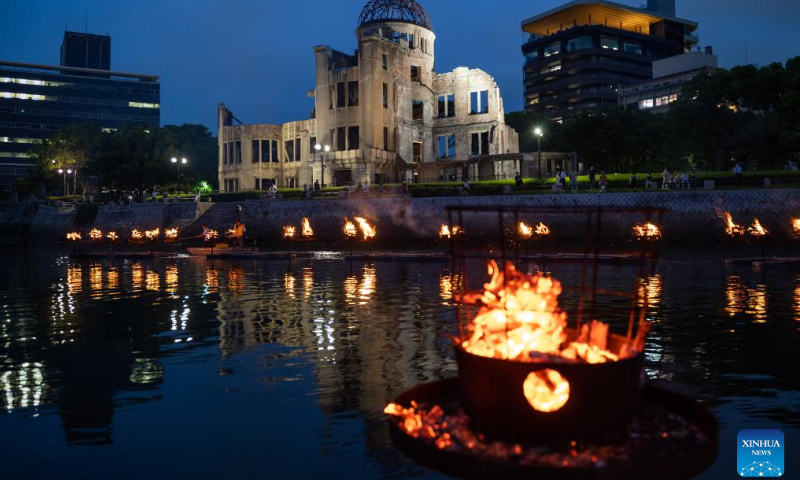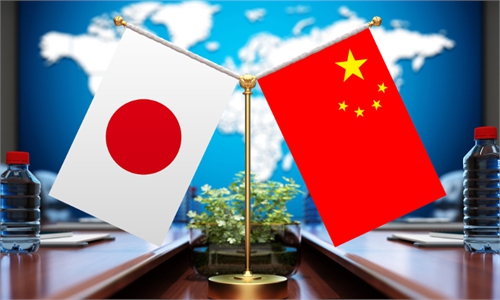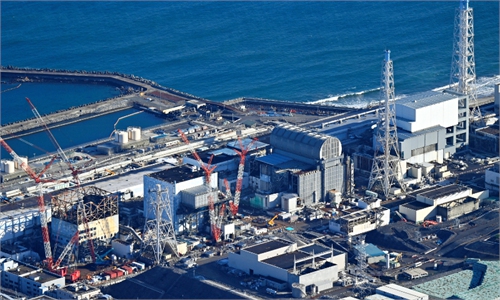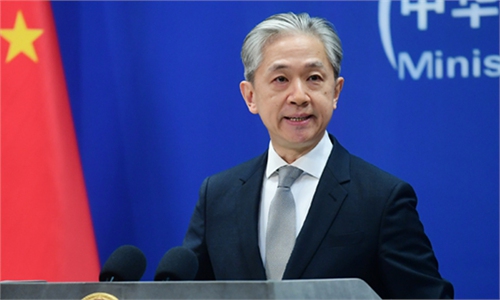
Photo taken on August 5, 2022 shows bonfires at the site of the atomic bombing near the Peace Memorial Park to mark the 77th anniversary of the atomic bombing of Hiroshima in Hiroshima, Japan. Photo: Xinhua
Recently, two Chinese students in Japan posted an eight-minute video on a Chinese website to try and introduce Hiroshima's local special cuisine called "Bakudan ramen." In the video, when answering questions from netizens about how much Japanese people know about the atomic bombings in their country, the two said that Japanese people don't know much about the truth and that Hiroshima people "only think they are victims, but they don't know why they were bombed." The two said they had "no sympathy for the Hiroshima atomic bombing." The video was posted on social media in Japan and other countries with Japanese subtitles, sparking a heated controversy. A Hiroshima city councilor called for a detailed investigation into the matter, while some Japanese netizens also expressed their anger and protest.It should be clear to those who have watched the video that although it talks about the atomic bombing in Hiroshima, the subject is two young people introducing food and drink. The dialogue happens in a full-of-life restaurant, and is aimed at Chinese netizens. Compared to the heavy topic of the atomic bombing, the expression of these two students is, indeed, not serious enough and has some casualness. But it is far from intentional or malicious mockery, and there is no "aggression" or "arrogance." Instead, the words from the two Chinese students mainly express their personal feelings and experiences. From the point of view of the Hiroshima people, it may sound uncomfortable; but if they can also think differently or have a full and accurate knowledge of history, they will not make a big deal out of this video and magnify the issue.
If we put aside the tone and emotions, the video intentionally or unintentionally points out the issue of Japan's lack of profound reflection on its history as a whole. Many Japanese people today do not understand or misunderstand historical facts, which is a general impression they leave on neighboring countries.
It cannot be solely attributed to their lack of empathy, when these two young Chinese people expressed their inability to sympathize with the victims of the Hiroshima atomic bombing. Just imagine, when Japanese politicians pay homage to World War II (WWII) war criminals again and again, and keep rubbing salt into the wounds of the countries that were invaded back then, how can they gain the understanding of the victims? Why is it impossible to sympathize? This question should have caused a spiritual shock within Japan and prompted concrete actions to reverse its image in the face of other countries.
The overreaction and sensitivity of the Hiroshima city council members and some Japanese netizens are inseparable from Japan's incorrect education on WWII. On the one hand, Japanese people, including politicians, still have a weak awareness of history, in which they were the aggressors. On the other hand, Japan has been intentionally revising and beautifying its own aggressive behavior since the end of the war and has become obsessed with portraying itself as a victim.
In recent years, Japan has constantly been "whitewashing" its war crimes in textbooks, either trying to downplay the history of forcibly recruiting "comfort women" when invading neighboring Asian countries or brushing over the Nanjing Massacre. It is even trying to modify the timeline of the massacre in the Nagasaki Atomic Bomb Museum. This further illustrates the huge gap in historical awareness between Japan and its Asian neighbors.
The nuclear bombing is a scar for Hiroshima and Nagasaki, while the wounds left by Japanese fascism in Asia-Pacific countries, including China, are everywhere. They remind people of the horrors of war and the value of peace. All innocent victims, regardless of nationality, deserve to be commemorated and sympathized with. But if militarism in Japan is not thoroughly cleared and eradicated, it will be the biggest betrayal and disgrace to innocent victims. However, many people feel that Japan has not learned lessons from history. In such a context, victims and their descendants cannot be relieved.
Many NGOs in Hiroshima and Nagasaki are dedicated to anti-war efforts, and they deserve greater respect and support. However, in recent years, the Japanese government has further disregarded its aggressive history and downplayed the harm it caused to the Chinese and Asian people. This runs counter to anti-war efforts. Truly righteous, peace-loving people, including Japanese citizens, should be indignant at Japan's right-wing forces, rather than two young people who may have lost a sense of propriety in what they said.



